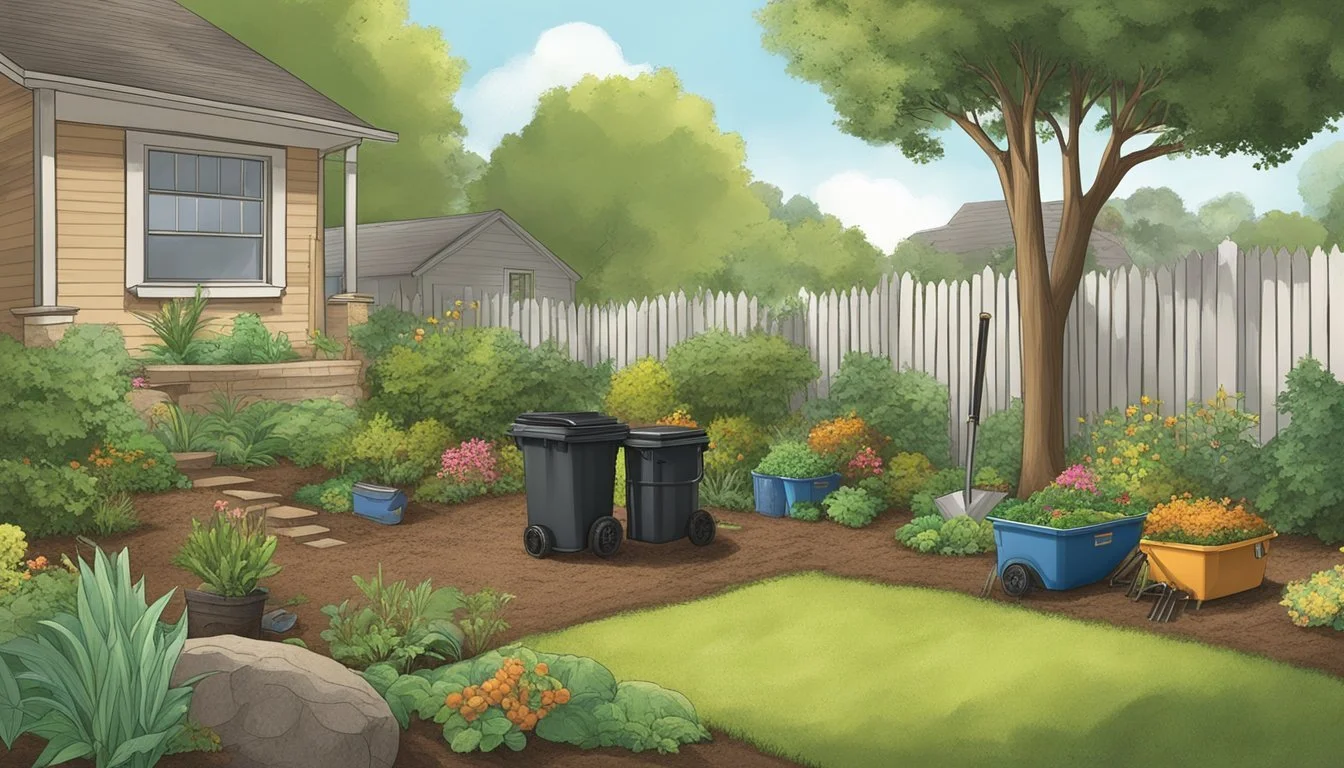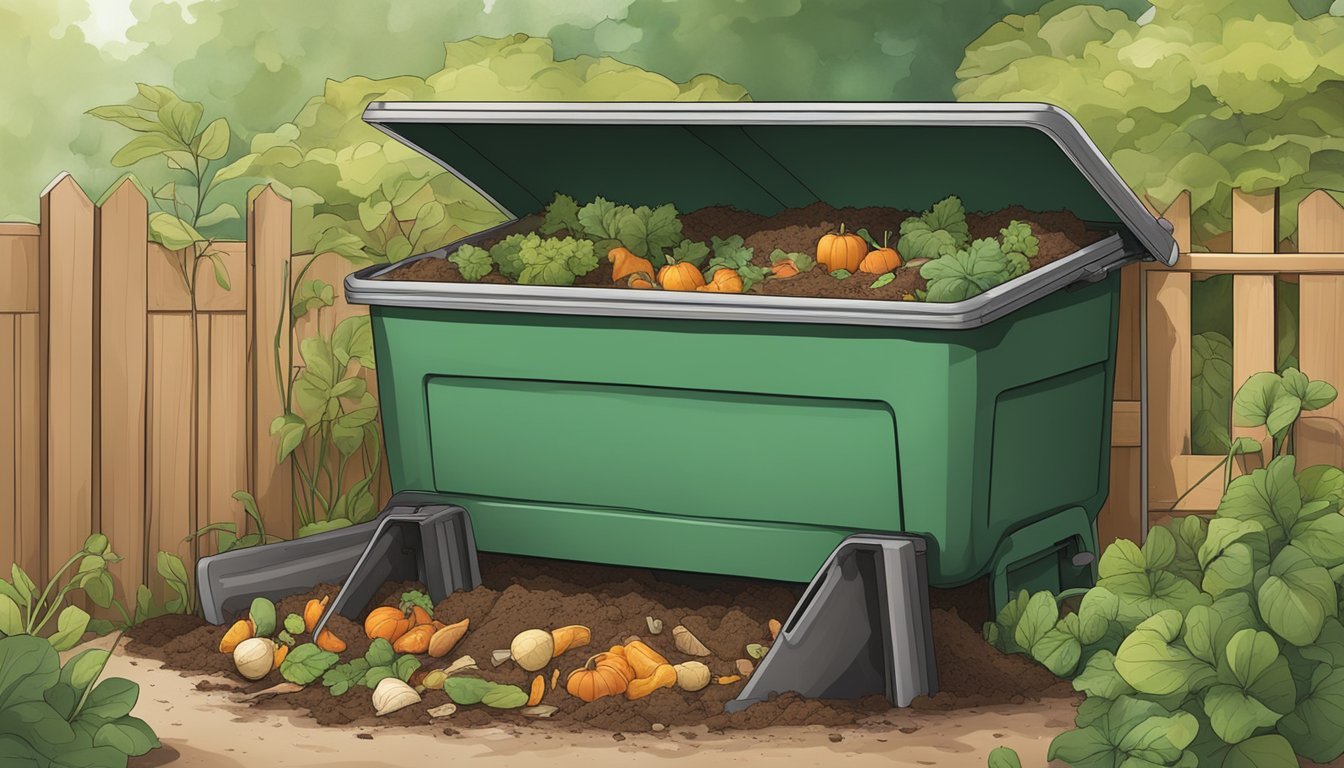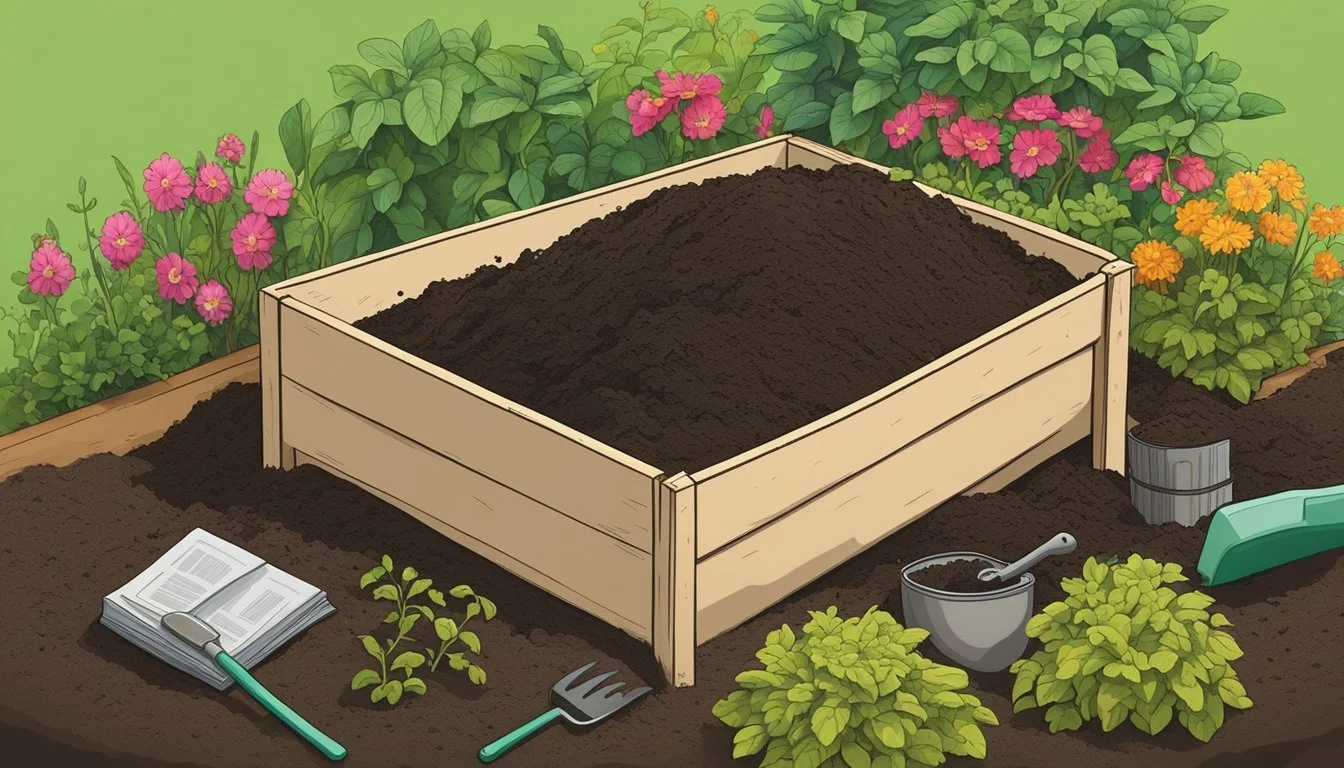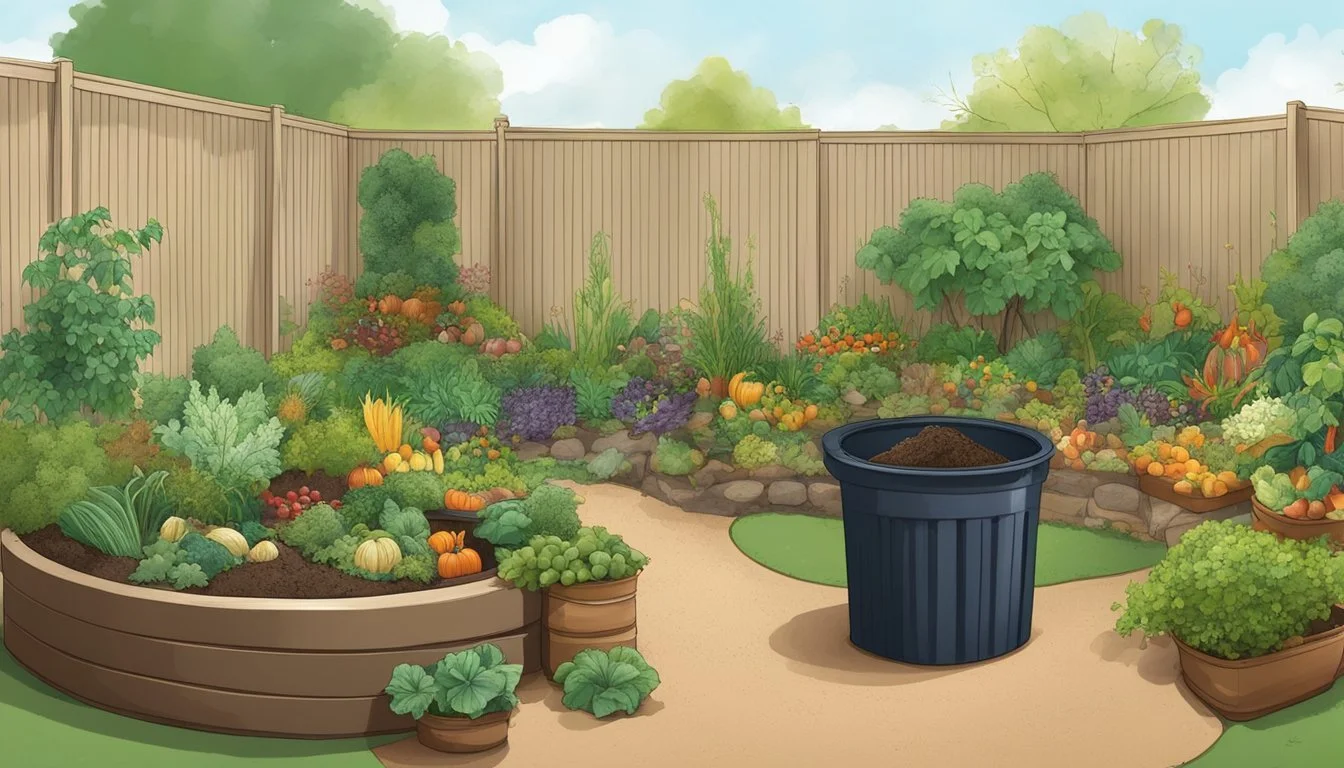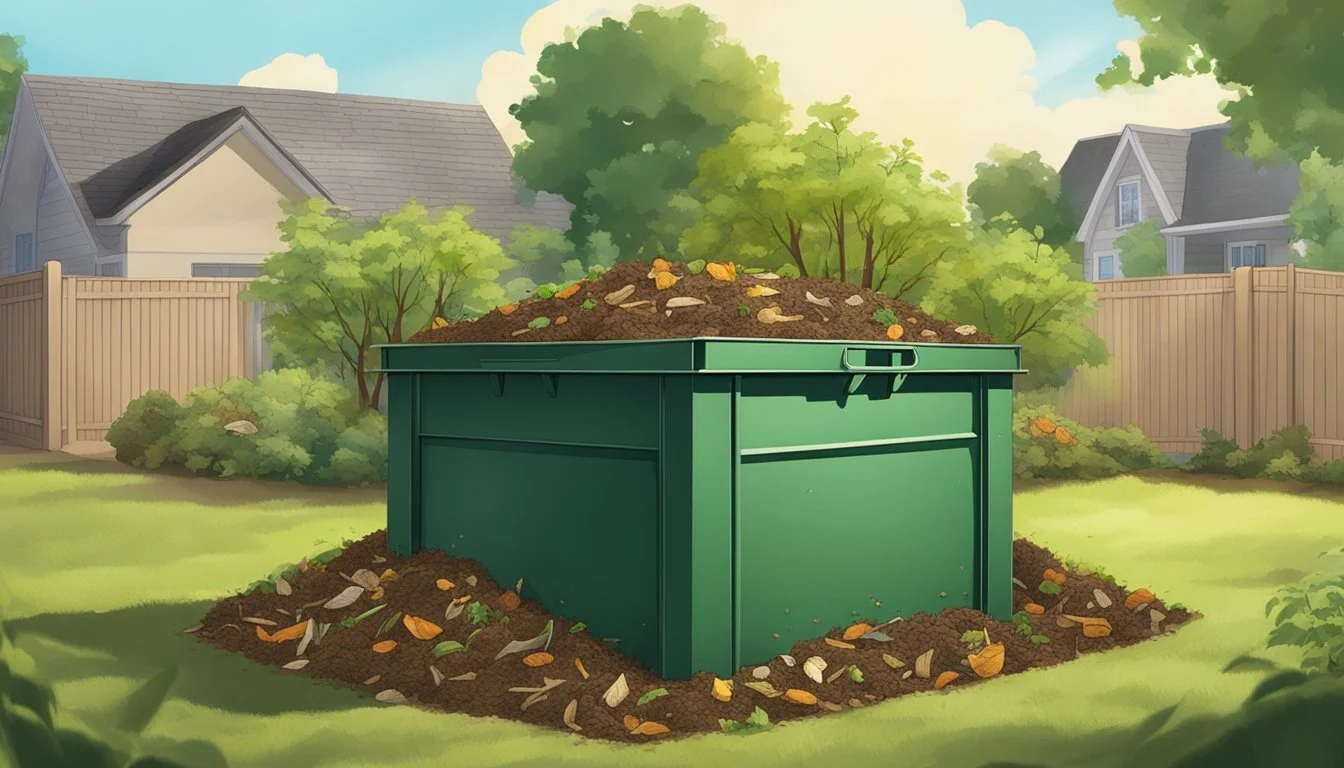Guide to Composting in Tyler, TX
Environmentally-Friendly Waste Reduction Tips
Composting has garnered attention in Tyler, TX as an effective means of transforming kitchen and yard waste into valuable organic fertilizer. The city's warm climate provides an ideal environment for composting, which not only enriches the soil but also reduces the amount of waste sent to landfills. Residents can take advantage of local resources such as Texas Organic Soil for learning about soil science and composting practices, ensuring they are equipped with the knowledge to start and maintain their compost heaps successfully.
The City of Tyler supports sustainable living practices, highlighting the significant impact that composting can have on garden health and waste reduction. They estimate that the average household produces over 200 pounds of kitchen waste annually, which can be effectively converted into nutrient-rich compost for gardening. By incorporating composting into their daily routine, Tyler residents can contribute to a greener community and promote sustainable growth in their home gardens.
The Basics of Composting
Composting is an eco-friendly way to turn organic waste into valuable soil amendment, enriching the ground for healthier plant growth. It's a simple method that recycles kitchen and yard waste into nutrient-rich compost.
What Is Composting?
Composting is the process by which organic materials, such as leaves, vegetable scraps, and branches, are converted into a soil-like substance through natural decomposition. Microbial organisms break down this organic waste in the presence of air and water, resulting in a humus-like material called compost that is rich in nutrients.
Benefits of Composting
By transforming organic waste into compost, one not only reduces the waste being sent to landfills but also enhances the soil's structure, fertility, and the ability to retain water. Compost provides a slow-release of essential nutrients such as nitrogen, phosphorus, and potassium, which plants require for healthy growth.
Composting Principles
When starting a compost pile, it's critical to balance "greens" and "browns":
Greens are nitrogen-rich materials like fruit and vegetable scraps or coffee grounds.
Browns are carbon-rich materials, including dried leaves, twigs, and cardboard.
Here's a brief outline of composting essentials:
Balance: Aim for a ratio of roughly 3 parts browns to 1 part greens for optimal decomposition.
Air Circulation: Regularly turn the pile to introduce air, which aids in breaking down organic matter and reducing odors.
Moisture: The pile should be moist like a wrung-out sponge to support the microorganisms responsible for decomposition.
Size: A pile should be at least 3 feet by 3 feet to maintain the necessary temperature for decomposition but small enough to be turned easily.
By adhering to these composting principles, one can create a sustainable, closed-loop system returning valuable organic materials back into the earth, improving soil health and plant vitality in Tyler, TX.
Starting Your Compost Pile
Creating a successful compost pile in Tyler, Texas involves choosing the right location, selecting suitable materials, and proper layering of those materials to facilitate decomposition.
Choosing a Location
A compost pile should be situated in an area that has good drainage and some exposure to sunlight. This spot should be easily accessible year-round. The City of Tyler recommends an open, level area which will help maintain the balance of moisture and temperature that composting requires.
Selecting the Right Materials
Your compost should consist of a balance between carbon-rich materials, known as 'browns', and nitrogen-rich materials, or 'greens'. Browns can include dry leaves, straw, and shredded paper, while greens encompass vegetable scraps, food waste, and yard debris like grass clippings. Avoid adding meats or dairy products, as they can attract pests and produce odors.
Layering Your Compost
Begin layering by placing a thick layer of brown materials at the base to absorb excess moisture and promote air flow. Follow this with a thinner layer of green materials. It's advisable to maintain a ratio of four parts browns to one part greens for optimal balance. Periodically turn the pile to aerate it, which expedites the composting process.
In the layering process, intersperse your more common kitchen scraps and yard waste, which will introduce necessary organic material and microorganisms. Regularly turning your compost pile will ensure that it breaks down evenly and efficiently.
Composting Techniques
In Tyler, TX, residents have several effective methods to convert organic waste into nutrient-rich compost. From traditional methods to innovative techniques, understanding the varying processes helps one to choose the right method for their needs.
Traditional Composting
Traditional composting involves creating a compost pile where yard waste and food scraps are layered to decompose over time. This approach requires maintaining a balance between greens, such as vegetable scraps, and browns, like dried leaves. To optimize decomposition, the compost pile needs to be periodically turned to aerate it, which encourages aerobic microbes to break down the organic matter. In Tyler, layering the right materials can lead to successful composting, one example being to maintain a pile that is typically 3 feet by 3 feet.
Vermicomposting
Vermicomposting uses earthworms, particularly red wigglers, to accelerate the composting process. Worms consume organic waste and excrete castings that are high in nutrients and microorganisms. This technique can be done indoors in bins, making it an excellent option for those with limited outdoor space. The worms not only break down the waste but also help aerate the compost, increasing the oxygen level and thereby enhancing the quality of the compost.
Aerobic vs. Anaerobic Composting
Aerobic composting requires oxygen to support the microorganisms that decompose organic matter. It is characterized by turning the compost regularly to ensure air flow, which speeds up the process and reduces odors.
Anaerobic composting, in contrast, occurs in the absence of air, leaving the decomposition to occur naturally over a longer period. This process can produce a distinct odor and is typically slower than aerobic methods.
Bokashi Composting
Bokashi composting is an anaerobic process that ferments organic waste, including meat and dairy, which are often not used in other composting methods. It involves layering the waste with a specific Bokashi bran that contains microorganisms to aerate and accelerate decomposition. The byproduct includes a nutrient-rich tea that can be used as a liquid fertilizer. This method can be easily managed under the kitchen sink and is a space-efficient option in Tyler.
Compost Maintenance
Maintaining a compost pile in Tyler, TX involves careful balancing of materials and monitoring of environmental conditions. Regular attention to these key aspects ensures efficient decomposition and a rich end-product for gardening and landscaping.
Balancing Green and Brown Materials
A healthy compost pile requires a balance of greens (nitrogen-rich materials) and browns (carbon-rich materials). Greens include items such as food scraps and grass clippings, while browns encompass materials like dry leaves and straw. It's recommended to follow a ratio of approximately 3 parts browns to 1 part greens. This balance helps maintain the right conditions for microorganisms to break down the material.
Watering and Aeration
Moisture and air are crucial to the composting process. The pile should be kept as damp as a wrung-out sponge. If the pile is too dry, decomposition slows down, while excess water can create anaerobic conditions and cause odors. Turning the compost pile regularly, perhaps every 2 to 4 weeks, introduces necessary oxygen and helps distribute moisture evenly.
Monitoring Temperature and Moisture
Temperature is an indicator of microbial activity within a compost pile. A pile that's heating up is generally a sign that the composting process is proceeding well. Compost thermometers are useful tools to monitor the pile's core temperature, which should be between 130°F and 160°F. Additionally, moisture levels can be checked with a simple hand test; the compost should feel moist but not overly soggy.
Troubleshooting Common Issues
When composting in Tyler, TX, residents may encounter issues such as persistent odors, unwelcome pests, or slow decomposition. This section and its strategies, rooted in local experience, can help efficiently mitigate these challenges.
Dealing with Odors
Should a compost pile begin to emit unpleasant smell, it’s often due to an excess of nitrogen-rich materials or insufficient oxygen. Balancing the pile with more carbon-rich or "brown" materials, such as dried leaves or straw, can rectify this. Moreover, turning the pile to introduce oxygen can be an effective solution. For a specific ratio that reduces odors, it is suggested that a carbon-to-nitrogen ratio of 25-30:1 is maintained.
Managing Pests
Pests are attracted to open compost piles for easy access to food. To deter them, the compost should be covered with a wire mesh and any kitchen scraps buried within the center of the pile. Adding layers of soil can also mask the smell and discourage pests. If pests persist, reviewing a list of appropriate materials for composting and removing any attractants is recommended.
Accelerating Decomposition
For those finding that their compost pile is breaking down too slowly, adjustments may need to be made regarding the pile's moisture and temperature. A balance of moisture is crucial; the pile should be as wet as a wrung-out sponge. If too dry, water should be added gradually, and if too wet, more dry materials should be incorporated. Additionally, turning the pile can redistribute heat and oxygen, both key factors in speeding up decomposition. Track and manage temperatures to ensure they fall within ideal ranges, as they can inform you on whether action is needed to maintain the process.
Using Finished Compost
Finished compost is a nutrient-rich amendment that can significantly improve garden soil health. Proper application supports plant growth and reduces the need for chemical fertilizers.
Determining Compost Maturity
Before using compost, one must ensure its maturity. Mature compost will have a dark color, crumbly texture, and earthy smell. It should not have any remnants of the original organic materials. To test if the compost is ready, one can do a simple germination test by planting seeds in the compost and observing if they grow adequately.
Applying Compost to Your Garden
For Garden Beds: Work two to four inches of finished compost into the top six inches of your garden soil before planting. This helps create a fertile environment for plants by improving soil structure, moisture retention, and nutrient content.
For Potted Plants: An equal mix of compost, perlite or vermiculite, and garden soil can be used to create a high-quality potting mixture that will sustain the plant's nutritional needs.
As Fertilizer: Compost can also be used as a surface mulch around existing plants, providing nutrients while helping the soil retain moisture. It's recommended to add a one to three-inch layer of compost around the plants, keeping it clear from the base to avoid stem rot.
Incorporating finished compost into one's gardening practice enriches the soil, promotes healthy plant growth, and recycles organic household waste into a valuable resource.
Composting in Community Settings
Composting at a community level can effectively reduce organic waste and diminish the burden on landfills, particularly in areas such as Tyler, Texas. These programs are not only beneficial for soil health but also serve as educational platforms to promote sustainable practices within urban and community spaces across the United States.
Community Garden Composting
In Tyler, community gardens become critical nodes for organic waste transformation. Gardeners and volunteers contribute kitchen scraps and garden waste to create rich, nutrient-dense compost. This compost is then used to nourish the garden beds, fostering a cycle of sustainability. The City of Tyler supports such endeavors to encourage local, Texas organic production and reduce solid waste.
Inputs: Kitchen scraps, leaves, branches
Outputs: Nutrient-rich compost for gardens
Urban Composting Initiatives
Urban composting initiatives, such as community composting projects, confront the challenges of solid waste management in densely populated areas. By turning food scraps and yard waste into compost, these initiatives help reduce the flow of organic materials to landfills. Such programs are crucial in Tyler for maintaining clean and healthy urban environments.
Key Components: Collection bins, composting sites, public participation
Educational Programs for Composting
Educational programs play a foundational role in spreading composting knowledge. In Texas, schools and community centers offer curricula that cover the importance of composting and teach participants how to start and maintain a compost system. These programs are imperative for long-term behavioral change towards waste management and sustainability in the United States.
Focus: Sustainable waste practices, compost system maintenance
Audience: Students, community members
Beyond the Basics
For residents of Tyler, TX, taking composting a step further means embracing a range of advanced methods, staying updated with local composting regulations, and discovering inventive applications of compost. This section aims to provide pivotal information on enhancing composting practices within the community.
Advanced Composting Techniques
Advanced composting techniques go beyond simple pile turning. They involve strategies to balance carbon-to-nitrogen ratios, aeration, moisture, and temperature to hasten decomposition and yield high-quality compost. Aerated static pile composting is one method where compost piles receive constant airflow through embedded pipes, reducing the need for physical turning. In-vessel composting is another high-efficiency alternative, where compost bins are enclosed to control environmental conditions more tightly. Methods like vermicomposting utilize red wiggler worms to process organic materials, offering an excellent solution for indoor composting or smaller spaces.
Composting Regulations in Tyler, TX
Tyler residents must adhere to specific regulations to ensure environmental safety and community health. Municipal bylaws mandate proper handling and placement of compost bins to deter pests and maintain sanitation. It's essential for composters to know that certain organic materials, such as meats and dairy products, should not be composted at home due to risks of attracting vermin and producing unpleasant odors. For up-to-date regulation information, contact the City of Tyler or consult Texas Master Gardener Program resources on composting in Texas.
Innovative Uses of Compost
Once compost has been processed, this nutrient-rich amendment finds use in myriad applications, both ordinary and innovative. Gardeners and farmers value compost for its ability to improve soil structure and foster plant growth. Beyond gardens and fields, compost is utilized in erosion control projects and land reclamation efforts, refurbishing soils that have been degraded. Implementing compost in public green spaces within Tyler contributes to the community’s sustainability efforts and reduces the volume of waste directed to landfill. Additionally, Texas Organic Soil demonstrates leadership by educating the Tyler community on compost and soil science, encouraging innovative approaches to recycling organic materials.
Environmental Impact
The practice of composting in Tyler, TX contributes significantly to waste reduction and ecosystem health, tackling pressing ecological concerns by converting organic waste into valuable soil amendments.
Compost and Waste Reduction
In Tyler, organic waste constitutes a notable fraction of the solid waste stream ending up in landfills. Composting diverts these materials, which can range from food scraps to yard waste, from landfill sites, resulting in decreased methane emissions, a potent greenhouse gas. For instance, according to the Texas Commission on Environmental Quality, specific regulations and guidance aim to bolster composting efforts by both Professionals and homeowners within the state, hence fostering a culture of responsible waste management.
Benefits to the Ecosystem
Soil quality in and around Tyler benefits when compost is integrated into local land. This process enriches the soil with vital nutrients, improves moisture retention, and mitigates the need for chemical fertilizers. Furthermore, the U.S. Environmental Protection Agency notes that the ecosystem receives a boost through composting as it promotes the creation of a biologically stable product that enhances the environment and ecosystems. By incorporating these composting practices, the community of Tyler not only addresses its carbon footprint but also invests in the long-term health and fertility of the soil within the United States.
Conclusion
Composting in Tyler, TX, represents a significant step towards sustainability and environmental stewardship. Through the systematic breakdown of organic waste, Tyler residents contribute to soil health and reduce landfill waste. Community involvement is essential; by learning the basics of composting and utilizing local resources like Texas Organic Soil, citizens can actively participate in the green movement.
Local initiatives, such as educational outreach programs, have encouraged composting at both individual and commercial levels. This effort is evident in the commitment of businesses and individuals alike to pursue high-quality composting practices.
It is important to recognize the long-term benefits of composting. This includes improved soil structure, increased nutrient content, and fostering an ecosystem conducive to plant growth. The adoption of composting can lead to a more sustainable Tyler, with benefits that extend beyond the immediate community.
In embracing composting, Tyler is setting an exemplary model for Texas cities to follow. There is a clear message that sustainability is both achievable and beneficial, reinforcing the region’s dedication to ecological responsibility.


